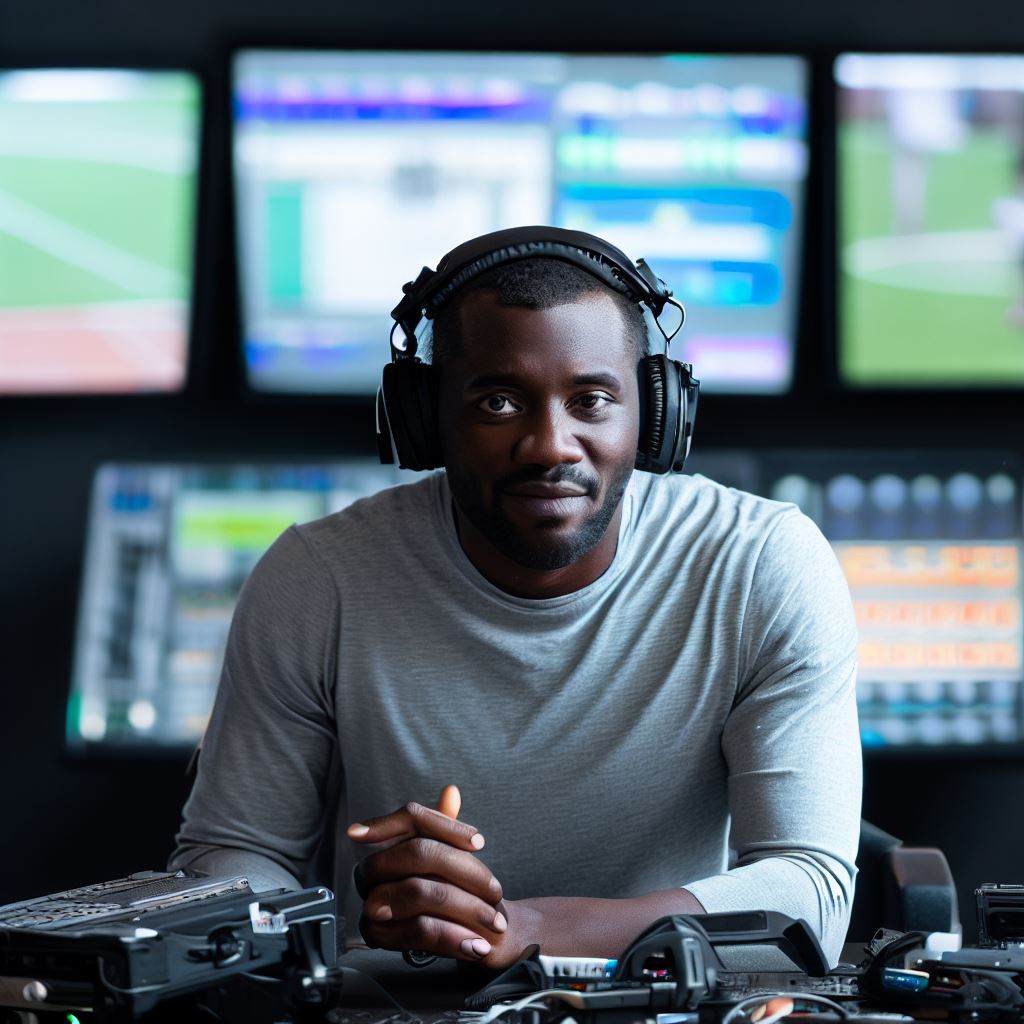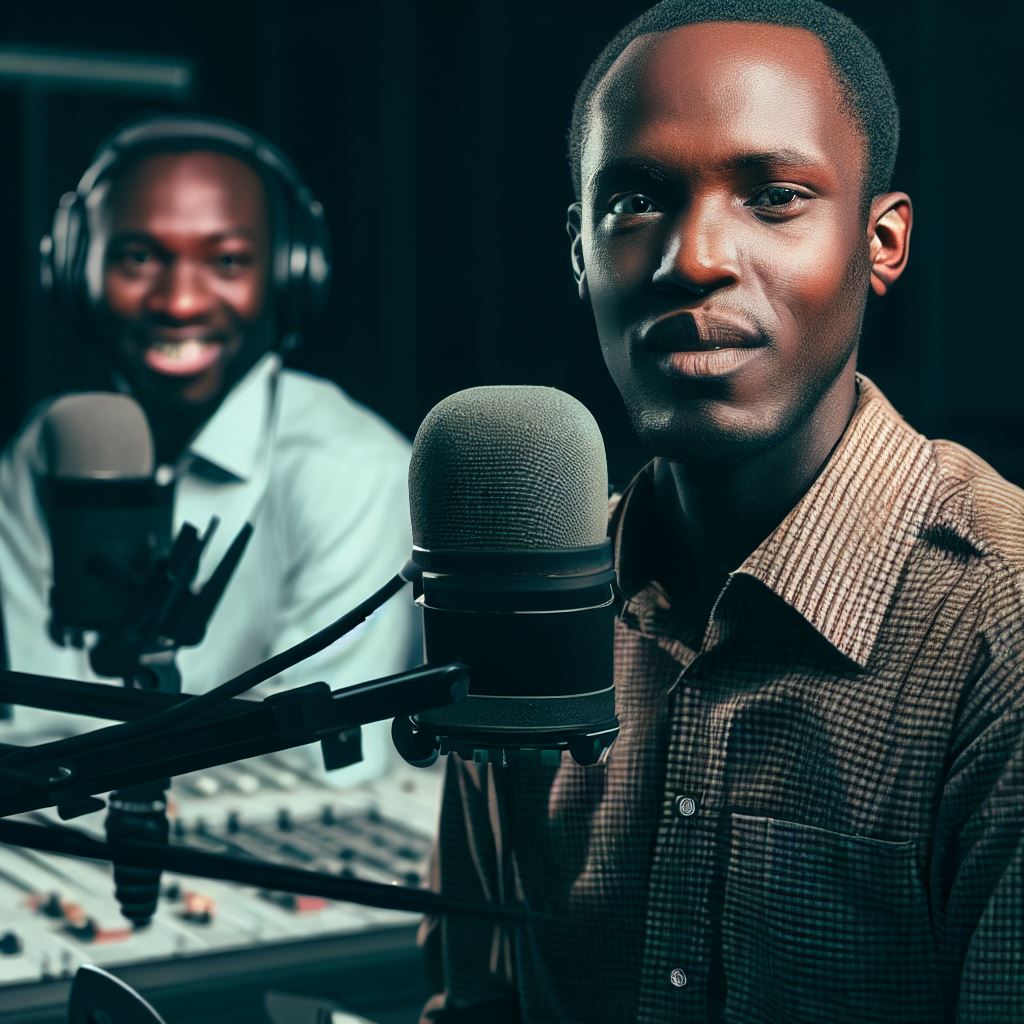Introduction
Let’s explore getting started in radio sports production: Nigeria.
In Nigeria, radio sports production plays a vital role in promoting and covering various sports events in the country.
Radio sports production serves as a platform for fans to stay updated with the latest sports news, helping to fuel their passion for various sports.
The purpose of this blog post is to provide an insightful overview of radio sports production in Nigeria and highlight its significance in promoting sports in the country.
Radio has been an integral part of sports coverage in Nigeria, dating back to its early days.
With the rise of technology and social media, radio still maintains its relevance and continues to be a primary source of sports information for many Nigerians.
Radio sports production involves various elements, including live game coverage, commentary, analysis, and interviews with players and sports experts.
These broadcasts not only entertain fans but also inform and educate them about the sport and its nuances.
One of the main reasons radio sports production is crucial is its accessibility. Radio reaches a wide audience, including those in remote areas with limited internet access.
It allows people from all walks of life to connect with their favorite sports teams and athletes.
Moreover, radio sports production plays a significant role in promoting local sports and uncovering hidden talents.
By giving exposure to lesser-known sports and athletes, it helps in increasing their popularity and attracting support from sponsors and fans alike.
In short, radio sports production in Nigeria serves as a dynamic medium for promoting sports, fostering engagement, and providing valuable information to sports enthusiasts across the country.
Understanding the Basics of Radio Sports Production
A. Definition and Scope of Radio Sports Production
Radio sports production refers to the process of creating and broadcasting sports content on the radio.
It involves capturing the excitement and energy of sports events and delivering them to the audience through an audio medium.
Radio sports production includes live commentaries, interviews, analysis, and other related content.
B. Key Roles and Responsibilities in Radio Sports Production
- Play-by-play commentator: The play-by-play commentator is responsible for describing the action as it happens during a sports event. They provide a detailed account of the game, including scores, player actions, and strategies.
- Color commentator: The color commentator adds analysis, insights, and expert opinions to the play-by-play commentary. They enhance the depth and understanding of the game for the listeners.
- Producer: The producer oversees the entire radio sports production process. They coordinate with the commentators, engineers, and other staff to ensure smooth operation and high-quality production.
- Engineer: The engineer handles technical aspects such as operating and maintaining the equipment, ensuring proper sound levels, and troubleshooting any technical issues that may arise during the broadcast.
C. Essential Equipment and Software for Radio Sports Production
Radio sports production requires a range of equipment and software to deliver a professional and engaging broadcast.
Some essential items include:
- Microphones: High-quality microphones are essential to capture the commentary, interviews, and ambient sound during a sports event.
- Headphones: Commentators and producers use headphones to monitor the audio and ensure the quality of the broadcast.
- Audio mixing console: An audio mixing console allows for adjusting sound levels, adding effects, and blending multiple audio sources together.
- Audio recorder: An audio recorder is used to capture and store the audio content during the broadcast. It enables editing and archiving of the sports coverage.
- Computer and editing software: Computers with editing software like Adobe Audition or Pro Tools are used to edit, enhance, and produce the final audio content.
- Internet connectivity: Reliable internet connectivity is crucial for live streaming, accessing online resources, and conducting interviews with remote guests.
In addition to the equipment, radio sports production relies on specialized software for various tasks such as audio editing, live streaming, and social media integration.
These software tools help in enhancing the broadcast quality, engaging with the audience, and keeping up with the evolving digital landscape.
Understanding the basics of radio sports production is crucial for aspiring professionals in Nigeria.
By grasping the definition, roles, responsibilities, and equipment required, individuals can lay a strong foundation for a successful career in this field.
Read: Radio Sports Production in Nigeria: Legal Aspects
Developing the Skills Required for Radio Sports Production
A. Improving language and communication skills
- Read books, articles, and newspapers to expand vocabulary and develop a command of language.
- Practice speaking clearly and confidently, focusing on articulation, pronunciation, and modulation of voice.
- Take part in discussions and debates to improve communication and public speaking skills.
- Listen to radio sports announcers and commentators to learn how they effectively communicate information.
- Regularly engage in activities that require written communication, such as writing scripts or articles about sports.
B. Enhancing knowledge of various sports
- Watch different sports events on television and attend live matches to gain firsthand knowledge.
- Read about the rules, history, and strategies of various sports to expand your knowledge base.
- Follow sports-related news and blogs to stay updated with the latest developments in different sports.
- Interact with sports enthusiasts and professionals to discuss and learn more about different sports.
- Join sports clubs or organizations to actively participate in different sports and gain practical experience.
C. Practicing live announcing and commentary
- Set up a recording system and practice announcing sports events live.
- Focus on building a strong, clear, and engaging voice while maintaining a conversational tone.
- Learn to provide play-by-play commentary, describing the action on the field accurately and effectively.
- Develop the ability to analyze and interpret the game in real-time, offering insightful comments and highlighting key moments.
- Seek feedback from experienced announcers and make necessary adjustments to improve your skills.
D. Mastering audio editing and production techniques
- Learn how to use audio editing software to manipulate and enhance sound recordings.
- Practice editing recorded sports events, focusing on trimming, fading, and mixing audio tracks.
- Experiment with adding sound effects, music, and voice-overs to create a polished final product.
- Develop skills in adjusting audio levels, equalizing, and cleaning up background noise.
- Stay updated with the latest audio editing and production techniques through online tutorials and courses.
By consistently developing and honing these skills, aspiring radio sports producers in Nigeria can enhance their abilities and increase their chances of success in the industry.
Read: Salaries of Radio Sports Producers in Nigeria: Data
Legal and Ethical Considerations in Radio Sports Production
In radio sports production, it is crucial to be aware of the legal and ethical considerations that govern the industry.
This section will explore important aspects such as copyright laws and permissions, ethical guidelines for responsible sports reporting, and the significance of fair play and impartiality.
A. Copyright laws and permissions
- Copyright laws protect original works, including sports broadcasts, from unauthorized reproduction or distribution.
- Obtaining proper permissions is essential before using any copyrighted material in radio sports production.
- This includes seeking permission from both the broadcaster and the parties involved in the sports event.
- Violating copyright laws can lead to legal consequences and damage the reputation of the radio station.
- Proper attribution should always be given when using quotes, audio clips, or any other copyrighted content.
B. Ethical guidelines for responsible sports reporting
- Responsible sports reporting requires adherence to ethical guidelines to maintain credibility and integrity.
- Accuracy in reporting should be prioritized, ensuring that information shared is verified and factually correct.
- Reporters should avoid sensationalism and strive to provide objective and unbiased coverage of sports events.
- Respecting the privacy and dignity of athletes, coaches, and other individuals involved is crucial.
- Avoid conflicts of interest or situations that may compromise the integrity of the reporting.
- Transparency and disclosure of any relationships or biases that could influence reporting are essential.
C. Importance of fair play and impartiality
- Fair play and impartiality are fundamental values in radio sports production.
- Reporters should avoid favoritism, ensuring that their coverage is fair and objective.
- Providing equal opportunities for coverage to all sports and teams, regardless of popularity or personal preferences.
- Avoiding the promotion of gambling or any form of corruption in sports reporting.
- Ensuring that the radio station or production team is independent from any external influence that may compromise objectivity.
- Supporting diversity and inclusivity by giving coverage to a wide range of sports and athletes.
By understanding and implementing these legal and ethical considerations in radio sports production, broadcasters can build trust with their audience and contribute to a responsible and fair coverage of sports events.
Read: Radio Sports Producing: Nigeria’s Emerging Careers

Building Relationships and Collaborations in Radio Sports Production
A. Networking opportunities within the sports industry
- Attend sports industry events and conferences to meet professionals and build connections.
- Join online communities and forums specifically dedicated to sports production to engage with like-minded individuals.
- Utilize social media platforms to connect with sports organizations, broadcasters, and other industry professionals.
B. Collaborating with sports organizations and teams
- Approach sports organizations directly to propose collaboration opportunities for radio sports production.
- Offer your expertise and services to cover their events, matches, or tournaments through radio broadcasts.
- Establish mutually beneficial partnerships with sports teams to gain access to exclusive content for radio production.
C. Establishing connections with fellow professionals
- Attend industry-related workshops and seminars to meet and connect with fellow radio sports production professionals.
- Participate in collaborative projects or initiatives with other radio broadcasters to strengthen professional relationships.
- Create a network of contacts within the radio industry who can provide support and guidance.
D. Creating a portfolio of work
- Compile a portfolio showcasing your best work in radio sports production to impress potential collaborators.
- Include a variety of sports events, interviews, and commentary pieces that demonstrate your skills and expertise.
- Showcase your ability to capture the excitement and passion of sports through engaging and dynamic radio production.
Building relationships and collaborations in radio sports production is crucial for success in the industry.
By actively networking and seeking out opportunities to collaborate, you can expand your professional network, gain access to exclusive content, and enhance your portfolio.
Read: Skills Needed for Radio Sports Production in Nigeria
Overcoming Challenges in Radio Sports Production in Nigeria
A. Limited resources and infrastructure
- Lack of state-of-the-art equipment hinders the production quality and professionalism.
- Limited funding makes it difficult to invest in necessary resources and infrastructure.
- Improvisation becomes crucial to make the most out of the available resources.
- Collaborating with sponsors and partners can help acquire additional resources and funding.
- Training staff and technicians to maximize the use of limited resources is essential.
B. Competition from other media platforms
- Radio sport production faces competition from television, internet, and social media platforms.
- Balancing traditional radio broadcasting with online content creation can broaden the audience reach.
- Creativity in radio sport content production and delivery can help radio differentiate from other media platforms.
- Offering unique and exclusive coverage not available elsewhere can attract listeners to radio sports broadcasts.
- Collaborating with other media platforms to cross-promote and create synergy can also be beneficial.
C. Navigating cultural and linguistic differences
- Nigeria is a diverse country with many different ethnic groups and languages.
- Broadcasting in multiple languages allows for wider audience engagement and inclusivity.
- Hiring bilingual or multilingual staff can help bridge the linguistic gap and avoid miscommunication.
- Sensitivity to cultural practices and preferences is important for effective sports coverage.
- Establishing partnerships with local communities and organizations can deepen understanding and improve content creation.
D. Adapting to changing technology and trends
- Radio sport production needs to keep up with advances in technology and changing consumer preferences.
- Embracing digital platforms and streaming services can expand the reach and accessibility of radio broadcasts.
- Engaging with listeners through social media, online polls, and interactive features enhances audience interaction.
- Continuous training and development of staff in digital skills and content creation is crucial.
- Monitoring and analyzing data on audience preferences and consumption habits can guide decision-making for content strategies.
In essence, radio sport production in Nigeria faces various challenges, including limited resources and infrastructure, competition from other media platforms, navigating cultural and linguistic differences, and adapting to changing technology and trends.
However, by seeking innovative solutions, collaborating with partners, embracing digital platforms, and engaging with the audience, these challenges can be overcome.
With dedication and creativity, radio sports production in Nigeria can thrive and continue to entertain and inform sport enthusiasts across the country.
Tips for Starting a Career in Radio Sports Production in Nigeria
Starting a career in radio sport production in Nigeria can be an exciting journey filled with learning opportunities and personal growth.
Here are some valuable tips to help you pave the way for success in this field.
A. Seeking internships or volunteer opportunities
One important strategy is to actively seek internships or volunteer opportunities within local radio stations or sports organizations.
This hands-on experience will allow you to learn the ropes of radio sports production and gain practical skills.
Consider assisting with live broadcasts or other production tasks to get a feel for the industry.
B. Building a strong online presence and personal brand
Building a strong online presence and personal brand is also crucial.
Create a professional website or portfolio where you can showcase your work in radio sports production.
Utilize social media platforms to demonstrate your expertise and connect with individuals in the industry.
Regularly update your content and engage with your audience to maintain a consistent online presence.
C. Continuously learning and staying updated on industry trends
Continuously learning and staying updated on industry trends is essential for success in radio sport production.
Stay informed about the latest advancements and techniques in the field. Attend workshops, conferences, or seminars to expand your knowledge and skills.
Subscribe to industry newsletters, podcasts, and blogs to receive regular updates and further enhance your understanding.
D. Emphasizing passion, dedication, and perseverance
Lastly, emphasize your passion, dedication, and perseverance.
During interviews or conversations, showcase your genuine enthusiasm for radio sport production.
Demonstrate your dedication by going above and beyond in your work and continuously striving to improve your skills.
Understand that setbacks or challenges may arise, but perseverance is key to succeeding in this field.
In general, starting a career in radio sport production in Nigeria requires a proactive approach.
Seek internships or volunteer opportunities to gain hands-on experience.
Build a strong online presence and personal brand to showcase your work. Continuously learn and stay updated on industry trends.
Emphasize your passion, dedication, and perseverance throughout your journey.
By following these tips, you can increase your chances of success in the exciting world of radio sport production.
Conclusion
Throughout this blog section, we have explored the world of radio sports production in Nigeria.
We started by understanding the importance of sports broadcasting and the role of radio in shaping the narrative.
We then delved into the necessary skills and knowledge required for a successful career in radio sports production.
From the technical aspects like audio editing and commentary skills to the behind-the-scenes work of research and preparation, we highlighted the various elements that contribute to delivering high-quality sports broadcasts to the listeners.
To all the aspiring radio sport production professionals in Nigeria, we encourage you to pursue your passion relentlessly.
The Nigerian sports industry holds immense potential, and with the right dedication and skills, you can contribute significantly to its growth.
Remember, success in this field requires continuous learning, adaptability, and the willingness to go the extra mile.
Take advantage of internships, networking opportunities, and mentorship programs to enhance your knowledge and gain practical experience.
As we conclude this blog section, it’s important to acknowledge the evolving nature of radio sport production.
With advancements in technology and the increasing popularity of digital platforms, the future holds exciting possibilities for the field.
Nigeria’s vibrant sports culture, combined with the passion of its people, creates a fertile ground for radio sports production to thrive.
Embrace the changing landscape, explore new avenues, and always strive for excellence to play a significant role in shaping the future of sports broadcasting in Nigeria.
In summary, radio sports production in Nigeria offers immense opportunities for individuals with a passion for sport and broadcasting.
By mastering the necessary skills, staying up-to-date with industry trends, and embracing innovation, you can make a lasting impact in this dynamic field.
So, go ahead, chase your dreams, and become a valuable voice in Nigerian radio sports production.




